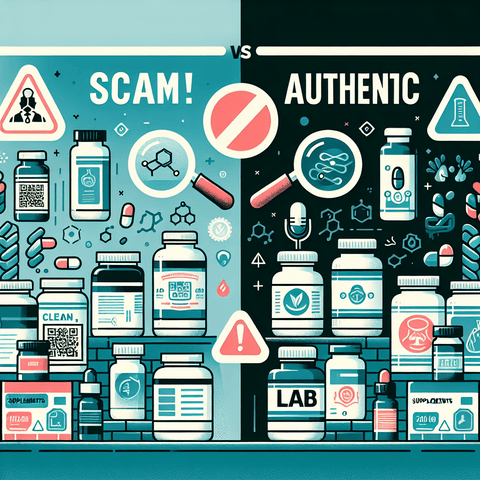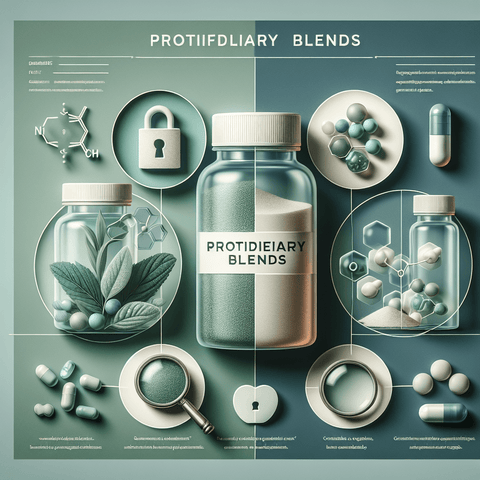The global nutritional supplement market is thriving like never before. With increasing awareness around health, immunity, and disease prevention, consumers are actively turning to vitamins, minerals, and functional supplements for additional support. Categories like Vitamin C, Omega-3, Vitamin D, Magnesium, and Vitamin K are especially popular for their contributions to overall health based on EFSA-approved claims.
However, this booming interest has created fertile ground for an alarming trend: the rise of scam supplement products. From misleading labels to fake packaging and contaminated ingredients, unscrupulous players pose a threat to both consumer health and trust. Scam supplements not only fail to deliver benefits, but can also contain harmful, unknown, or illegal substances.
Understanding how to identify scam or counterfeit supplements is vital in protecting your health. The good news is that spotting the red flags isn’t rocket science. With proper education and vigilance, you can separate the trustworthy products from those that could put your well-being at risk.
In this blog post, we will delve into all the critical warning signs of supplement scams. We’ll examine the tactics used by fraudulent companies, how to check for legitimacy, and what errors to avoid when purchasing a supplement. Whether you’re a fitness enthusiast, health-conscious parent, or someone beginning your wellness journey, this guide will empower you to make informed and safe purchases.
What is a Scam Supplement? Understanding the Basics
Before we can identify scam supplements, it’s essential to understand what defines one. A scam supplement is any product that is sold under false pretenses regarding its ingredients, manufacturing process, benefits, or certifications. They may claim to offer miraculous results without scientific support or transparency. Some may not contain any active ingredients at all, while others replace them with potentially harmful substances.
The dietary supplement market is particularly vulnerable to scams due to its relatively lenient regulatory environment. In many countries, including across the EU, supplements are not held to the same standards as pharmaceutical medications. Even though European agencies like EFSA (European Food Safety Authority) regulate health claims and ingredient safety, enforcement gaps remain—especially when products are sold online or imported from non-EU sources.
Fraudsters exploit these vulnerabilities using various strategies:
- Hosting slick-looking websites with no verifiable contact information
- Making exaggerated or unverified health claims
- Creating imaginary brands or shell companies with no scientific background
- Using social media influencers or celebrities without genuine endorsements
One disconcerting case involved imported libido-enhancing supplements found to contain sildenafil, the active ingredient in prescription Viagra—despite being presented as “natural.” This not only violated multiple laws but posed a serious health risk to people with cardiovascular conditions. In another case, a weight-loss product contained sibutramine, a drug banned in many countries due to its cardiovascular risks. These real-world incidents underline how scam supplements can jeopardize health.
Understanding that not every flashy bottle equates to a legitimate product is your first step in avoiding health hazards. With the right strategies, consumers can safeguard their purchases and steer clear of fraudulent traps.
Fake Supplements: How to Distinguish the Real from the Repackaged
Fake supplements are counterfeit versions of legitimate products or completely fraudulent items masquerading as reputable brands. Recognizing fakes requires scrutiny at several levels—starting with the packaging. Some of the visual clues to watch out for include:
- Mismatched logos or pixelated brand images
- Unusual font sizes, spacing issues, or misspellings on the label
- Expired “best before” dates or overlapping print codes
It’s also vital to compare the listed ingredients against trusted databases or the manufacturer's original specifications. Fake products often display ingredients that either don’t exist or aren’t clinically validated. In worse cases, dangerous substances are included without disclosure.
The risk expands when buying from unregulated e-commerce platforms or marketplaces that allow third-party vendors. Purchasing your supplements from certified health retailers like Topvitamine ensures that all products are sourced from reputable manufacturers, transparently labeled, and undergo third-party verification where applicable. Legitimate sellers are also licensed and provide multiple customer contact options and return policies.
Another increasingly useful strategy is utilizing technology. A growing number of manufacturers include QR codes on their labels. Scanning these codes can lead to certification documents, lot tracking, and product testing reports. If a product lacks any traceability—be especially cautious.
To sum up, while counterfeit supplements often hide in plain sight, careful attention to packaging quality, ingredient integrity, and the legitimacy of the point of purchase can help you sidestep these dangers. When in doubt, consult databases like European Union Rapid Alert System for Food and Feed (RASFF) or reach out to customer service for verification before buying.
Supplement Fraud Warning Signs Every Health Consumer Should Know
Scam supplements often use provocative marketing designed to inspire impulsive purchases. Recognizing these red flags can save you from wasting money—or worse, endangering your health. Here are the top fraudulent warning signs to look out for when evaluating a nutritional supplement:
1. Overhyped or Absolute Claims
Statements like "100% guaranteed to work," "miracle cure," or "instantly melts fat" are typical of scam supplements. EFSA regulations strictly prohibit unsubstantiated health claims. If something sounds too good to be true, it almost always is.
2. No Third-Party Testing or Lack of Certifications
Companies selling genuine nutritional products often provide third-party lab testing results confirming ingredient authenticity and purity. Products lacking these certifications operate in a regulatory blind spot. Trustworthy supplements go the extra mile for transparency.
3. Proprietary Blends Without Clear Dosages
While “Proprietary Blend” may sound impressive, it often means that the exact amount of each ingredient is not disclosed. This tactic not only hides potentially ineffective doses but can conceal unsafe levels of active ingredients.
4. No Contact Information
A legitimate supplement company will always offer verified addresses, customer service emails, and often direct lines to speak with a representative. If there is no traceable company or registered business address, consider it a red flag.
5. Too-Good-to-Be-True Reviews
Scam websites often showcase five-star reviews filled with glowing, unrealistic outcomes. These testimonials usually lack detail or come from unverified users. Doing a wider web search for external reviews can add a much-needed reality check.
Carefully reading between the lines of marketing jargon and utilizing independent reports can significantly reduce the risk of falling victim to supplement fraud. Make transparency your guiding principle—if it’s vague, skip it. Be sure to shop through trusted platforms like Topvitamine’s Vitamin D or Magnesium collections to secure your health regimen.
How to Identify Bogus Supplements on the Market
Bogus supplements have flooded marketplaces, especially online. These fraudulent products often disguise themselves under slick branding and misleading taglines. Here's how you can dissect the bad from the good using several critical indicators:
Ingredient Labels That Raise Red Flags
Watch out for vague ingredients such as “natural blend,” “energizing matrix,” or “exclusive botanical complex.” These euphemisms often evade scrutiny and keep consumers in the dark about what they are actually ingesting.
Manufacturer Deception
In some cases, entirely fake companies are invented to lend credibility to the product. Beware of manufacturers with no physical address, tax identification, or registration in reputable directories. Use Topvitamine’s catalog and partner products—for instance, their curated Vitamin C selection—to shop only verified labels.
Deceptive Marketing
Fake endorsements from celebrities or references to “doctor recommended” claims without citing specific scientific publications are tactics used to manipulate buyers. Always verify these claims with objective, peer-reviewed sources or through official verification bodies.
Absence of Clinical Studies
Reputable supplement brands refer to EFSA-approved studies or at least provide links to clinical trials that justify a product’s benefits. Scam supplements typically lack this layer of scientific scrutiny.
Technology to the Rescue
Mobile applications and tools like barcode scanning apps or certification checkers can help identify legitimate frontline markers. Several of these apps cross-reference product info with national databases to ensure compliance with safety regulations.
By analyzing a product's label, manufacturing legitimacy, marketing appeals, and scientific backing, you can navigate the supplement space with confidence.
Counterfeit Health Products: The High Cost of Falling for a Fake
Counterfeit supplements are a severe subset of scam products—and arguably the most dangerous. These fake versions mimic real branding but contain little resemblance to the original product’s quality or formula. Counterfeits infiltrate the market via international smuggling, unregulated supply chains, and anonymous sellers.
Global health authorities, including those in the EU, have reported a surge in counterfeit supplements containing pharmaceutical-grade substances without label disclosure. These illegal additives can include steroids, amphetamines, and diuretics—notorious for causing severe side effects such as liver damage, arrhythmia, and more.
The public health consequence of counterfeit supplements goes beyond inefficacy. Documented instances have led to hospitalizations due to toxicity, allergic reactions, or contamination with heavy metals and bacteria like Salmonella or E. coli.
The most vulnerable product categories include male sexual enhancement, weight-loss pills, sleep aids, and cognitive enhancers. These are often “lifestyle” supplements, marketed as quick fixes to universal desires, making them particularly susceptible to fraud.
Defending against counterfeit may require taking ownership of your health decisions. Relying on verified retailers with transparent sourcing and established reputations—such as Topvitamine’s Omega-3 line—can be your best defense. Avoid third-party sellers on generic marketplaces and refrain from purchasing any health product that doesn’t list certifications or batch numbers.
Risky Dietary Supplements: Assessing the Health Hazards Beyond the Label
Health risks associated with scam supplements aren't always visible on the packaging. Some of the most significant dangers come from hidden or undeclared substances. A study by the European Directorate for the Quality of Medicines & HealthCare (EDQM) found numerous supplements laced with illegal pharmaceuticals.
One notorious example was the addition of DMAA (1,3-dimethylamylamine), a stimulant no longer considered safe due to risks of high blood pressure and heart issues. Users of such tainted products experienced symptoms ranging from dizziness and nausea to severe cardiac events.
People on prescription medications must also be wary of drug-supplement interactions. For example, combining blood thinners with high-dose Vitamin K from unknown sources can lead to complications. Transparency around active ingredients and sourcing is critical, especially for supplements targeting weight loss, bodybuilding, and sexual performance.
Suspect a supplement isn’t safe? Report it to the national food or health safety authority or use EU-wide networks like RASFF. Incident reports help improve enforcement and protect vulnerable consumers.
Lastly, always consider discussing your supplement regimen with a qualified healthcare provider. Pharmacists and physicians can provide insight into whether a product aligns with your health goals or could pose risks. In conjunction, choose from certified assortments found on Topvitamine—your trusted destination for vitamin K, magnesium, and other verified categories.
Conclusion: Stay Informed, Stay Safe
Scam, fake, and counterfeit supplements represent more than just a monetary loss—they can endanger your life. The totality of red flags includes vague labels, exaggerated claims, lack of third-party testing, and inaccessible manufacturers. Discerning these warning signs is essential for every health-conscious consumer.
Stick to simple rules: never purchase supplements from unverified retailers, always read the full list of ingredients, understand the sourcing, and check for EFSA-compliant claims. Utilize QR codes, certification databases, and scientific studies to confirm authenticity.
Platforms like Topvitamine.com provide peace of mind by offering only those products that meet strict quality and safety criteria. Take back control of your health by empowering yourself with knowledge and vetted options.
Don't gamble your wellness. Stay smart, stay skeptical, and stay safe.
Q&A Section
Q: What is the most common sign of a scam supplement?
A: Over-the-top marketing claims like “instant cure” or “guaranteed results” signal a likely scam. Look for third-party validation instead.
Q: How can I verify if a supplement is legitimate?
A: Buy only from certified retailers like Topvitamine.com, scan QR codes on packaging, and check for third-party tests and EFSA-verified claims.
Q: Are supplements sold online generally safe?
A: Not all. Marketplaces allowing third-party sellers may list counterfeit products. Stick to specialized health platforms with strict quality control.
Q: What health risks are associated with counterfeit supplements?
A: Risks include exposure to unapproved drugs, toxins, allergens, and misuse of dosages. Consequences could range from nausea to severe organ damage.
Q: What should I do if I think I’ve consumed a scam supplement?
A: Stop usage immediately and consult a healthcare provider. Additionally, report your concerns to local health authorities or the vendor platform.
Important Keywords
scam supplement, fake supplements, health supplement fraud, counterfeit dietary supplement, red flags supplements, verify supplement authenticity, supplement safety, third-party testing, EFSA supplement claims, Topvitamine.com



